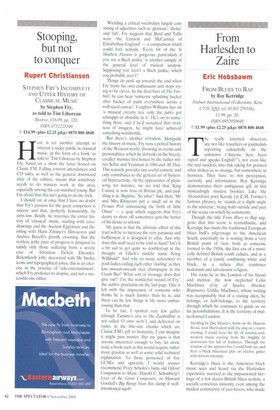Stooping, but not to conquer
Rupert Christiansen
STEPHEN FRY'S INCOMPLETE AND UTTER HISTORY OF CLASSICAL MUSIC by Stephen Fry, as told to Tim Lihoreau Boxtree, £16.99, pp. 320, ISBN 0752225340 (t) £14.99 (plus £2.25 p&p) 0870 800 4848 Here is yet another attempt to interest a wider public in classical music, in the form of a book 'as told to Tim Lihoreau by Stephen Fry, based on a show the latter hosted on Classic FM. Falling concert attendances and CD sales, as well as the general downward slide of the culture, means that somebody needs to do mission work in this area, especially among the ear-numbed young. But I'm afraid that this isn't going to do the trick.
I should say at once that I have no doubt that Fry's passion for the great composers is sincere and that, perfectly honourably, he aims low. Boldly, he traverses the entire history of 'classical' music, starting with cavedrawings and the Ancient Egptians and finishing with Hans Zimmer's film-scores and Andrea Bocelli's ghastly crooning. But the restless, jerky pace of progress is designed to satisfy only those suffering from a severe case of Attention Deficit Disorder. Relentlessly jolly, decorated with Mr Smiley icons and typographical jokes, this is an exercise in the practice of 'edu-entertainmene, which Fry professes to despise, and not a successful one either.
Wielding a critical vocabulaty largely consisting of adjectives such as 'glorious', 'divine' and lab', Fry suggests that Byrd and Tallis were 'the Lennon and McCartney of Elizabethan England' — a comparison which could fool nobody. 'Every bit of the St Matthew Passion is gorgeous, particularly if you are a Bach junkie' is another sample of the general level of musical analysis. Supposing you aren't a Bach junkie, which you probably aren't?
Things do perk up towards the end when Fry trusts his own enthusiasm and stops trying to be clever. In the final bars of The Firebird, he can hear 'someone splashing bucket after bucket of paint everywhere across a wall-sized canvas'; Vaughan Williams lays on 'a musical creamy tea, only the jam's got schnapps or absinthe in it'. He's on to something there, and if he'd sustained that vividness of imagery, he might have achieved something worthwhile.
But there's another irritation. Alongside the history of music, Fry runs a potted history of the Western world, throwing in events and personalities, which he debunks in the breezy, cavalier manner first honed by the rather wittier Seliar and Yeatman in 1066 and All That. This scarcely provides any useful context, and only contributes to the general air of hysterical hyperactivity. At the appearance of plainsong, for instance, we are told that 'King Canute is now boss of Britain plc, and paddling is in. Bigtime.' So what? And then, 'Mr and Mrs Khayyam put a small ad in the Persian Post announcing the birth of little Omar' — a quip which suggests that Fry's desire to show off sometimes gets the better of his desire to intOrm.
My guess is that the ultimate effect of this tract will be to increase the very paranoia and bafflement it is designed to allay. Just why does this stuff need to be sold so hard? Isn't it a hit sad to get quite so doubled-up at the thought of Gluck's middle name being Willibald? And why so many references to posh ladies calling each other 'darling' as they kiss mwaah-mwaah over champagne in the Crush Bar? What sort of message does that give out? 'I'm the wonderful wizard of Fry,' the author proclaims on the last page. One is left with the impression of someone who thinks he is much funnier than he is, and there can be few things in life more embarrassing than that.
To be fair, I spotted very few gaffes (though Tamino's aria in Die Zauberflote is not called '0 zittre nicht), and delivered on radio, in the bite-size chunks which are Classic FM's gift to humanity, I can imagine it might pass muster. But my guess is that anyone interested enough to buy, let alone read, a book such as this would require rather more gravitas as well as some solid technical explanation. To those possessed of five GCSEs and upwards, I would sooner recommend Percy Scholes's batty old Oxford Companion to Music, Harold C. Schonberg's Lives of the Great Composers, or Howard Goodall's Big Bangs than this damp if wellintentioned squib.


























































































































 Previous page
Previous page